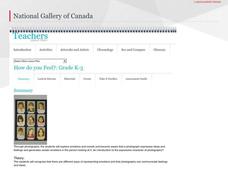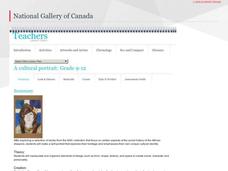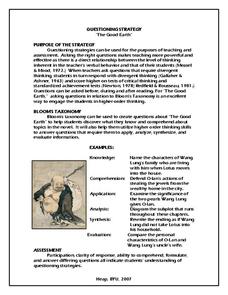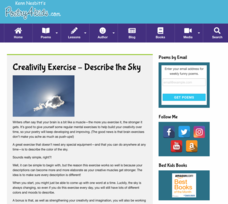Curated OER
1984 by George Orwell
Readers of Nineteen Eighty-Four engage in a close reading exercise that directs their focus to the key details Orwell provides in the opening paragraphs to introduce his dystopian society. The included worksheeet is divided into three...
Curated OER
The Conditional in Spanish
Under what conditions would your Spanish language learners use the conditional? They can find out here, and practice their new knowledge with the linked exercise. There is information about regular and irregular conditional verbs as well...
Curated OER
The Common Core Literacy Standards - Grade 3 Posters
Brighten your third grade classroom with this series of colorful Common Core displays. Including all of the English Language Arts standards and substandards, each with supporting illustrations and examples, this resource provides clear...
Houghton Mifflin Harcourt
Core Analysis Frame: Fiction
Dig into any piece of fiction with a series of analysis questions. There are two levels of questions provided: basic and in-depth. The basic questions can be copied double-sided onto a single piece of paper, while the in-depth questions...
National Gallery of Canada
How Do You Feel?
Photographs can show a range of emotions. Discuss Dorothea Lange's photo Migrant Mother and a range of other images in relation to emotion. After the discussion, class members contribute to a set of photographs that express various...
Students Against Depression
Understand Your Depression
What are the warning signs of depression? What contributes to and maintains this disorder? Learners answer several short-answer questions regarding depression using a well-designed student packet. The lesson concludes by...
National Gallery of Canada
A Cultural Portrait
Explore heritage and identity through an examination of art and a related project. The featured art, related to the African diaspora, includes several types of art created by different artists. Pupils consider their own backgrounds and...
Curated OER
Those Wacky Greek and Roman Gods: A Quick Cheat-Sheet
Here's a handy two-page reference that briefly identifies major Greek and Roman mythological figures.
Curated OER
Poetry Passport
Passport photos are notoriously unflattering but here's an activity that encourages youngsters to create a poetic picture of themselves using each category on the passport as a prompt for a poem.
Novelinks
The Good Earth: Questioning Strategy
Readers use Bloom's Taxonomy to create multi-level questions about Pearl Buck's The Good Earth.
Novelinks
The True Confessions of Charlotte Doyle: Guided Imagery
Prior to reading The True Confessions of Charlotte Doyle by Avi, spark engagement, and step into the shoes of Charlotte Doyle through this guided imagery activity focusing on adventure and the emotions that may be felt along...
Alpena-Montmorency-Alcona Educational Service District
4th Grade Personal Narrative
Throughout 10 lessons, fourth graders learn how to plan, organize, write, and edit their own personal narratives. In the beginning, young writers come up with ideas of personal experiences and the emotions linked with those experiences....
Curated OER
The Old Man and the Sea: Questioning Strategies
Readers learn to ask questions about text with an activity based on Ernest Hemingway's The Old Man and the Sea. As they read, class members craft questions based on Bloom's Taxonomy and then find the answers themselves.
Museum of Tolerance
Influence of Media
We are bombarded with media images expressly designed to influence viewers. Learning how to analyze the intended effects of these images is essential and the focus of an activity that asks viewers to use the provided questions to guide...
Seussville
Oh! the Places You'll Go!
Honor Dr. Seuss on his birthday with a read aloud of the story Oh! the Places You'll Go! and a variety of activities that inspire scholars to dream of their future endeavors. Readers take part in conversations, research the...
PBS
The Sixties: Dylan Plugs in and Sells Out
Before Woodstock, there was Newport. Get plugged in to the social changes of the 1960s with a activity that looks at Bob Dylan's performance at the 1965 Newport Folk Festival as a symbol of the radical changes that marked the era.
Curated OER
Poetic Elements
Poetry is all about sound and rhythm. The sound of the words, the rhythm of the lines, and the emotional atmosphere created by these elements and the literary devices poets use, compress whole stories into a few stanzas. The specialized...
Novelinks
Words by Heart: Guided Imagery
Sad, depressed, miserable, inconsolable, forlorn: so many synonyms have a lot of variety with their connotations. Through the guided imagery activity, writers explore the use of connotation and its influence on imagery and description by...
Brigham Young University
Understanding the Research Process
The second lesson in a unit on set design focuses on the importance of historical and stylistic research. Working in teams created in the previous session, groups consider what resources they will use as they consider design concepts for...
Poetry4kids
Creativity Exercise - Describe the Sky
Scholars stretch their writing muscles with an exercise that asks them to describe the sky using similes and metaphors.
Jamestown-Yorktown Foundation
Why Did Some Colonial Virginians Continue to Support the King?
Not all colonials supported the American Revolution. A resource from the American Revolution Museum at Yorktown ask young historians to investigate the reasons why some colonial Virginians were loyalist and continued to support King...
Poetry4kids
Playing With Your Food Poem Lesson
What's more fun than playing with your food? Writing a poem about it! A quick and straightforward lesson guides young writers through the steps of writing a funny, well-structured poem about combining sports and food.
American Museum of Natural History
They Glow!
Would you believe marine animals can make their own light? An online resource describes the process of bioluminescence and how animals in the ocean use it to survive. The lesson features a catchy tune that describes the behavior of ocean...
American Museum of Natural History
They Glow!
Let there be light! An interactive online lesson describes the process of bioluminescence and how ocean species use it to their advantage. The lesson highlights several specific species as well as provides vocabulary support with...
Other popular searches
- Descriptive Words for Mood
- Mood and Tone
- Mood and Tone Worksheet
- Tone Mood
- Teaching Mood and Tone
- Author's Tone and Mood
- Colors Conveying Mood
- Mood in Literature
- Identifying Mood
- Analyzing Tone and Mood
- Spanish Grammar Subjunctive
- And Mood























